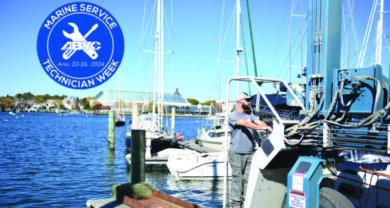U.S. Court of Appeals dismisses E15 lawsuit by industry, others
The U.S. Circuit Court of Appeals for the District of Columbia has ruled that marine industry groups and others challenging E15 blends did not have legal standing.
The court ruled that the plaintiffs — which included the American Petroleum Institute, several marine industry groups and a variety of partners in other industries — could not show that they had been damaged or would be damaged by the Environmental Protection Agency’s decision to issue a waiver allowing 15 percent ethanol blends (E15) into the market.
With this decision the court has set an extremely high bar for industry challenges to regulatory action and fails to fully comprehend the seriously flawed misfueling rule by the EPA, the National Marine Manufacturers Association said in a statement.
In 2012, this same group of industry stakeholders, including others such as the Grocery Manufacturers Association, legally challenged the EPA’s authority to grant a partial waiver permitting the sale of E15. That case was also dismissed on procedural grounds including a “lack of standing.”
In 2011, the EPA issued the waiver allowing the use of E15 in all 2001 and newer vehicles. It is prohibited in marine engines, but industry advocates worry there is potential for misfueling if boaters fill up at a gas station (as many do) rather than at a marina. Testing by the National Marine Manufacturers Association and others has show that E15 can cause severe damage to marine engines.
“NMMA will be working on behalf of the boating industry to do everything we can to prevent misfueling through education and to take the necessary actions to ensure that compatible, low ethanol fuels remain available and affordable for the 89 million boaters enjoying our waters across the United States.” said Nicole Vasilaros, director of federal and legal affairs for NMMA in a statement. “And while this decision is disheartening, the matter is far from over. NMMA continues to actively seek Congressional action that will reform the Renewable Fuel Standard and protect recreational marine products and consumers.”





Next time, sue with the toughest lawyers on your side! And throw HARD HARD evidence!
This IS ridiculous!!!! It IS a known fact that ethanol fuel is a problem in ANYTHING that isn’t used regularly. IE: Lawn equipment, marine engines, older cars, etc. I personally had a 1993 collector car that the fuel damaged the fuel injection system on 10% ethanol. $1000.00 later I was able to find a non-ethanol gas station!!! The farmers need to grow corn for food and stop the ethanol additive that damages engines AND causes less miles per gallon on a vehicle!!!
I have been using e-10 for 30 years in all my
vehicles . Cars motocycles mowers and tractors . I have never had a
fuel related issue. I use it in my Stratos/Johnson
bass boat also although I do not let it overwinter . Alcohol itself will not
damage your fuel lines . It is the denaturing
agent that is added to it so it can not be consumed is the culprit .
As for less mpg my Highlander gets better mileage with e15 that regular . Give it an honest test and see how you come out
I enjoyed your reply and feel, as you, that the e-15 is safe and the denaturing additive certainly messes with the internals.Thanks for your informative reply and see you down the road.
The above comments are strange since I have been told by most of the local repair shops around this area that work on small engines tell their customers do NOT use ethanol added fuel in your engine as you will most likely have problems. I personally was not using fuel additives when I was using the ethanol fuel and ended up purchasing 2 new carburetor so for 2 Stihl products! At that time I stopped using ethanol fuel as much as I could. Most people with older cars, marine gear, and older small engines KNOW the real story!
This week I replaced a $300 carberator on my John Deere mower.
The gasket on the filler cap was turned to black paste because of ethanol in the gasoline. I can’t afford to damage my 300 hp Yamaha so I use REC 90. – At $4.00 / gallon.
Clearly, something needs to be done about this issue, but the US Court in DC claims their is no problem… Which only figures.